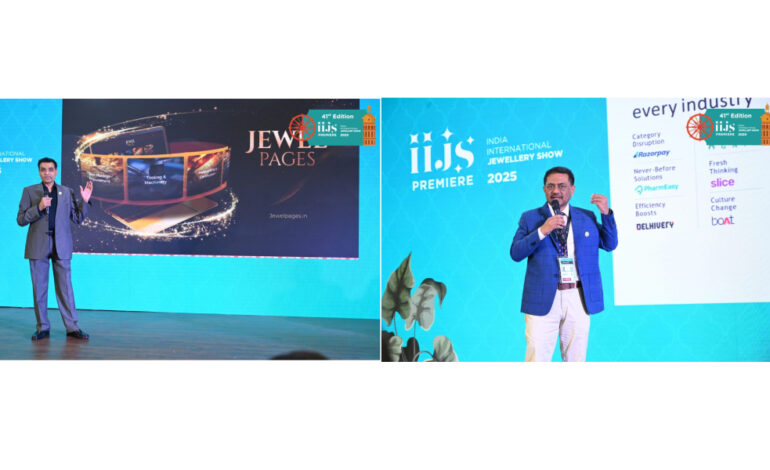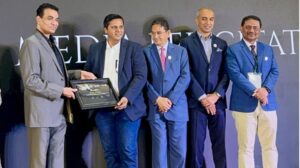JewelStart: India’s 1st G&J Start-Up Incubator to Help GJEPC Build for the Future
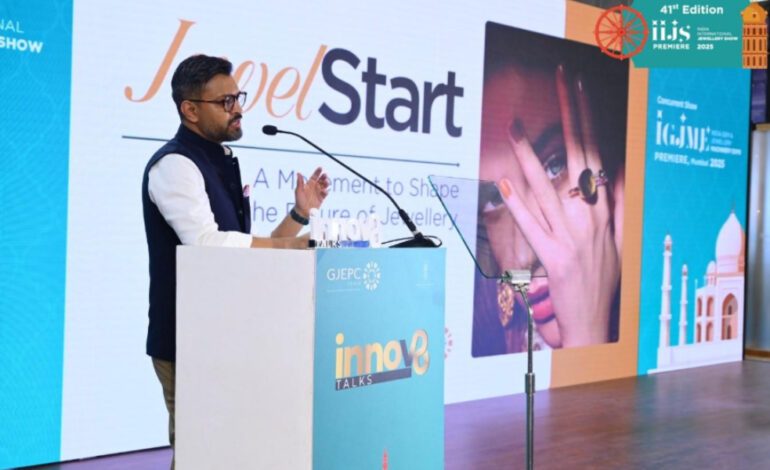
A movement is currently underway to shape the future of jewellery!
Over the years, GJEPC had always built for progress — from policy to exports to talent to infrastructure. Now, GJEPC is building for the future.
GJEPC’s ambition is to make India a jeweller to the world. This is possible as India has emerging markets, talent pools, culture of art & crafts; tech orientation, strong ecosystem and demographic dividend.
“JewelStart is our bold step to shape the future of jewellery,” proclaimed Tejas Mehta, Founder, Ausper in his Innov8 Talks session “Shaping the future of jewellery trade – India & Middle East synergies” held during IIJS 2025.
Mehta proudly introduced JewelStart, India’s first incubator for gems, jewellery and allied star-ups. Brace yourself for 200+ start-ups in the gem & jewellery sector over the next five years, as envisaged by Mehta.
Mehta pointed out that start-ups are redefining what’s possible in every category! Every sector has its breakout start-up stars — why hasn’t this breakthrough happened in the jewellery sector? he posed this thought-provoking question during his session.
Mehta highlighted that India is now the third largest start-up ecosystem in the world with 125k recognised start-ups, 100+ Unicorns creating 1.6 mn jobs and a total of US$ 140 bn of total funding over the last decade. The total projected contribution of start-ups to the GDP is expected to be US$ 1 trillion by 2030.
Start-ups disrupt the category, bring in fresh thinking and tech innovation, never before solutions, ignite efficiency boosts and change the consumer and trade culture.
Mehta confidently proclaimed that the start-up revolution in jewellery sector will unlock the next growth wave and lead to democratisation and market expansion. This wave entails digital disruption and CX; Innovation agility & ecosystem; Transparency and ethical revolution.
JewelStart’s motto will be to support, nurture and accelerate, said Mehta. JewelStart envisages three pillars that turn ideas into businesses: Market Access, Money & Mentorship. The Market Access entails early customers and distribution from Day Zero. Money refers to the Belief Capital from idea to traction — role of capital in early stage venture. Mentorship is all about guidance from industry experts who have done it before.
A series of sessions featuring captains of the industry were conducted.
The Market Access session was moderated by Sachin Jain (World Gold Council) and panellists included: Jagdish Mitra (Humanize), Suvankar Sen (Senco) and Rupesh Jain (Candere).
The Money session was moderated by Dravya Dholakia (Dholakia Ventures) and panellists included: Mitesh Shah (Inflection Point Ventures), Amit Jain (Ashika) and Bobby Kothari (Jewelex).
The Mentorship as a multiplier session was moderated by Isha Sapra (WeWin) and the panellists included: Pragya Batra (Quirksmith), Darayus Mehta (True Diamond), Dr. Tamaswati Ghosh (IIT-M Incubation Cell) and Dr. Ashok Mandal (NID).
The jewellery business is facing disruption. Mehta highlighted that the W5H (Who, Why, Which, Where, When, How) of consumers is shifting fast – GenZs don’t want their mothers’ jewellery collections. Rising prices + lab grown is juxtaposed with natural polarisation i the diamond business. AI, digital retail, story-telling and sustainability are rewriting brand building.
Mehta said, “We studied 30+ of the world’s best incubators and accelerators including NASSCOM 10000 start-ups, Combinator, Techstars, PlugandPLay, 500, SUSV, dlabs, VentureCatalysts, 100 Uncirons and JITO JIIF among others. We explored many in the international arena including education based, category based and luxury focused.”
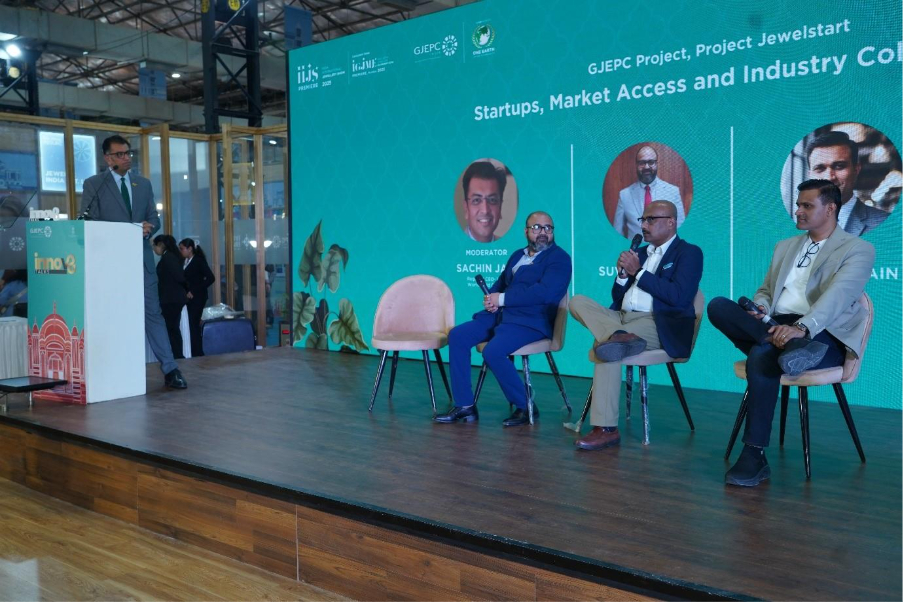
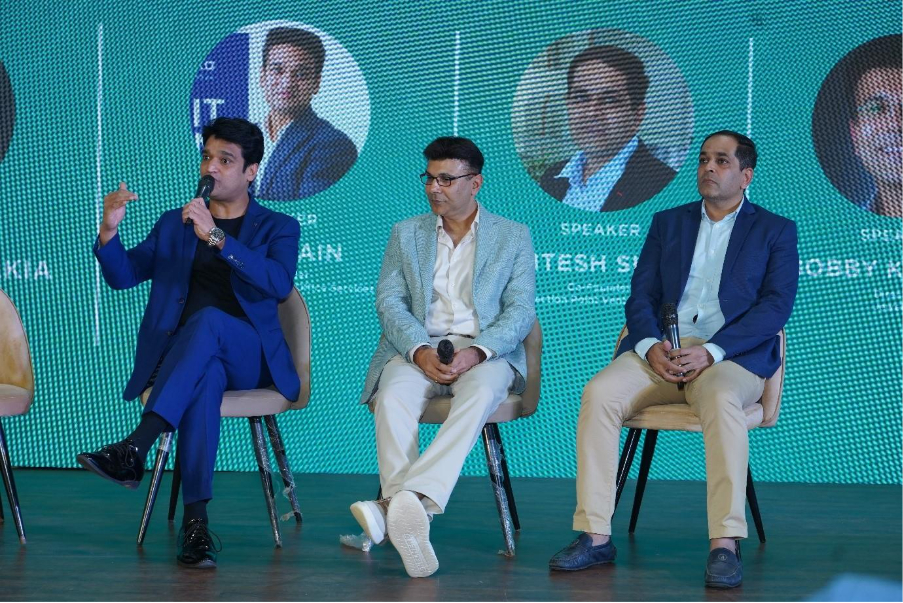
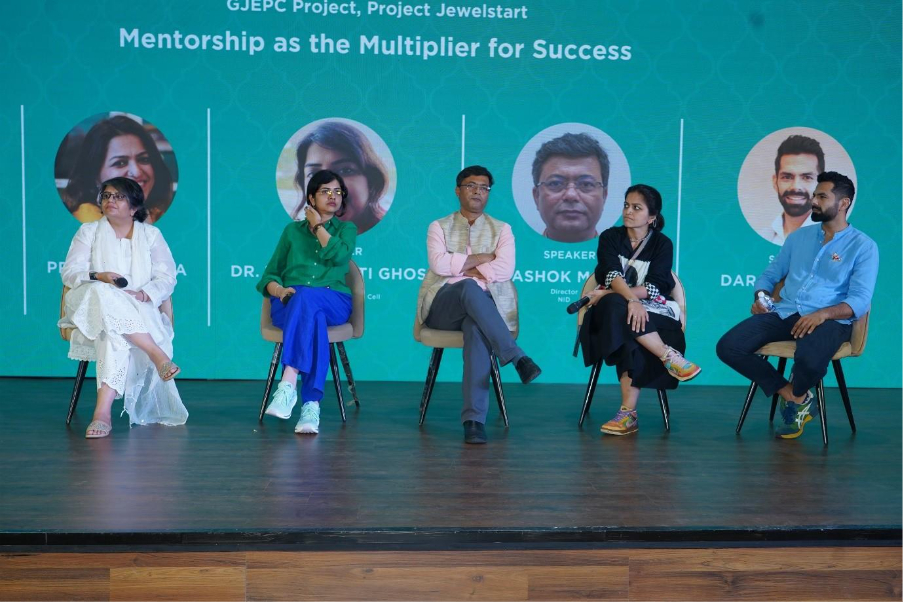
JewelStart will back jewellery brands which work with alternative metals and stones, fashion jewellery and wedding solutions among others. In terms of allied solutions, it will back those start-ups working in logistics, Kaarighar tech, AI use, sustainability and branding among others.
We are committed to kickstarting & evolving the journey over the next 4 months, said Mehta. The flow will entail: Academic & Research Partnerships, Discovery Stage, Del Flow, Mentorship, Prototype Building, Demo Day, Capital, Market Access & Scaling Strategy.
JewelStart will activate the entire ecosystem including robust infrastructure, Day 1 credibility, export know how. global buyer access, pool of skills, start-up friendly support, pro-innovation policy and wealth of data.
Mehta assured that JewelStart will match GJEPC’s ecosystem of legacy, craftsmanship. heritage, retail giants, skilled hands and established scale with new age digital-first, code, hyper growth, experience disruptors, smart-tech, start-up speed. It will stimulate category expansion through a culture of innovation fuelling a new growth wave.
JewelStart’s proposed snapshot of offering for 2026 is as follows…
- 2 Cohorts a Year: 4-month programs for 10–12 startups, launching Q4 2025 / Q1 2026
- 3 Core Pillars: Grants, Strategic Mentorship, Market Access via GJEPC
- Wide Sector Scope: Jewellery, gems, diamonds + allied tech and export domains
- Blended Format: Virtual + in-person sessions; anchored in Navi Mumbai, with activations across key hubs
- Impactful Demo Days: Curated showcases with industry leaders, VCs, and buyers
- JewelStart will support GJEPC as it works with NITI Aayog, DPIIT #startupIndia and Make in India to achieve this goal.
- To participate in this futuristic endeavour, email startup@gjepcindia.com
A thought-provoking panel discussion titled Project Jewelstart – Mentorship as the Multiplier for Success took centre stage at IIJS Premiere 2025, focusing on how structured guidance can transform the entrepreneurial journey — especially in traditional industries like jewellery, where access to networks and domain knowledge is often limited.
Jewellery brand founders Pragya and Darayu shared the challenges of entering the industry as non-legacy entrepreneurs. Lacking early mentorship, they relied on trial and error, eventually attracting mentors once their business gained traction. They stressed that ideal mentors are not just visionaries but hands-on guides who understand the operational grind. Peer mentorship, they noted, is equally valuable, offering candid and relatable insights. They advocated for authentic conversations over formal networking to build meaningful mentorship relationships.
Dr. Ashok from the National Institute of Design (NID) highlighted how design mentorship begins in the classroom, blending entrepreneurial thinking with innovation. NID supports start-ups through both tangible resources like funding and intangible support such as ecosystem access and interdisciplinary collaboration.
Dr. Tamaswati Ghosh, who leads the incubation cell at IIT Madras, emphasised that mentorship is the foundation of any robust start-up ecosystem. At IIT, mentors span academics, investors, industry veterans and peers — all carefully selected for their commitment. She underlined the need for institutes to be emotionally and professionally safe spaces for start-ups to thrive.
The panel collectively agreed that mentorship is not optional, but essential — especially at key junctures like ideation, early scaling and team building. In legacy industries like jewellery, structured mentorship programs and cross-pollination between traditional players and new-age founders can unlock tremendous innovation.
The session concluded with a call for GJEPC to take a leadership role in enabling formal mentorship networks that bridge the old and the new.


